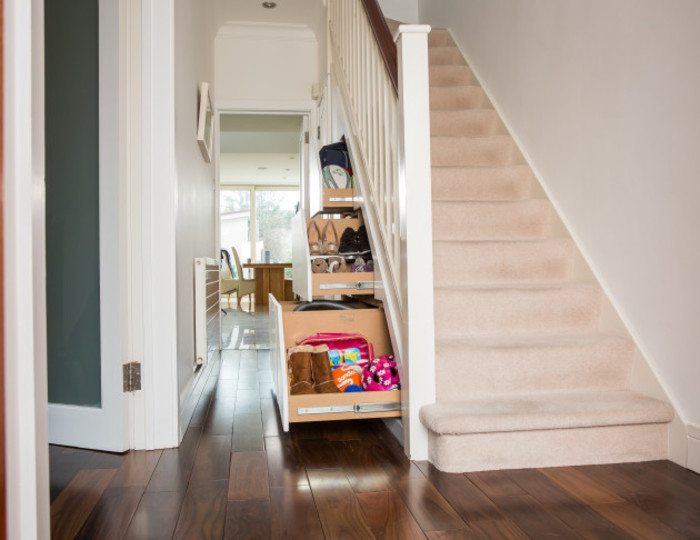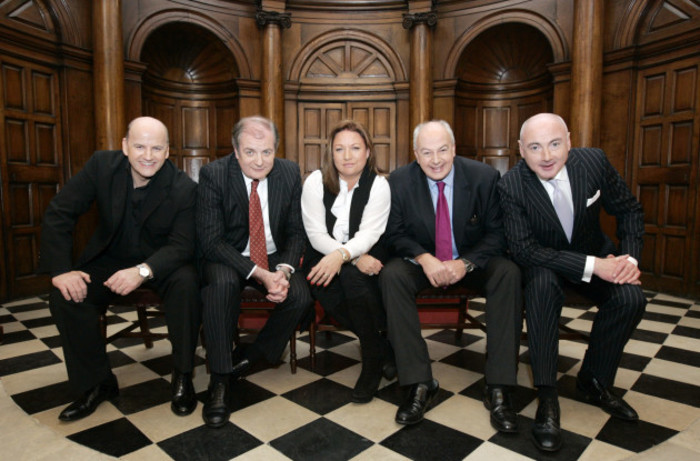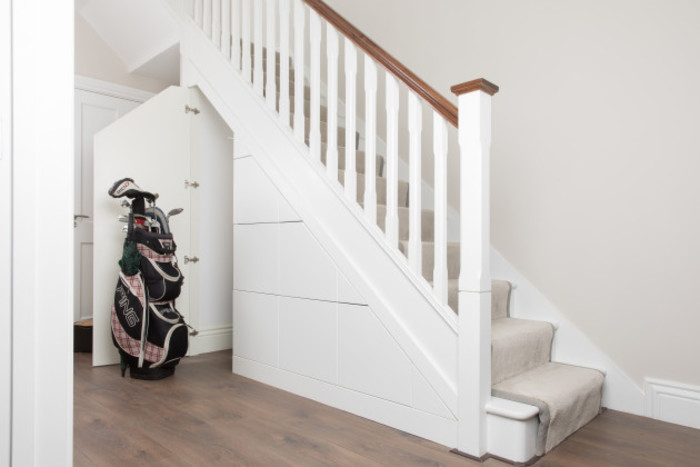‘Running your own business is quite a lonely experience at times’
As part of our How My Business Works series, we profile Wicklow-based Smart Storage.
THE IDEA BEHIND a business can come from a number of places. In Paul Jacob’s case, the light-bulb moment came from a very specific challenge he was facing at home.
“There was an ongoing shoe crisis in our house,” he tells Fora.
“Myself and my wife have two daughters and live in a three-bed semi-detached house with a lack of storage space, like a lot of other people.
“One Sunday I was cleaning out this wicker basket underneath the stairs that was stuffed full of shoes, and I thought that there must be a better way of doing this.”
With his background in the construction industry, Jacob decided to take matters into his own hands, designing and building a storage unit that would fit neatly under the stairs.
It solved the family’s problem but also attracted a lot of attention from visitors who came to the house.

“We had a lot of people come to us – neighbours and friends initially – saying they were interested and asking if we’d make one for them too,” he says. “Then we began to realise that maybe we could develop it as a business.”
Jacob had previously run his own construction business but says that it “went bang in the height of the recession” and left him looking for new opportunities.
In 2011, he turned his idea into a new venture, founding Smart Storage with his wife Clodagh, who had been working as an engineer.
With the couple’s combined experience and some capital left from the old business, they started developing discrete modular storage units, designed to fit “into every house in Ireland”.
Gaining traction
Starting the new business was one thing, but finding a way to make it grow was another.
Prompted by the reaction from the company’s early customers, Jacob decided to apply for RTÉ’s Dragons’ Den in 2012.
“I think we were quite confident with the product,” he says. “I approached Dragons’ Den very much as a platform to get our product in front of half a million people.
“But it was quite hard. If you’re doing a normal investor pitch you’re doing it with paperwork in front of you or a PowerPoint presentation or something.
“But when you do Dragons’ Den you just stand out there on your own – you’ve just got to know your business and be able to answer whatever questions they ask.
“Also, when you’re not used to being televised it adds that extra pressure. I think my pitch and interview were about 45 or 55 minutes long, but they got edited down to about six or seven minutes.”
However, this pressure paid off and Smart Storage received €65,000 in funding from magazine mogul Norah Casey in exchange for a 20% share in the business.
Since selling the bulk of her publishing company Harmonia last year, Casey has stepped down as a director of Smart Storage, but Jacob says that her brother Ciaran Casey is now a director of the firm and has regular involvement in the business.
 Norah Casey (centre) with fellow Dragons
Norah Casey (centre) with fellow Dragons
Investment aside, Jacob says that one of the biggest boosts from being on the programme was the reaction that the company received after the show was aired.
“We got a lot of encouragement from seeing stuff on Twitter that night and the follow-up enquiries that we got,” he says.
“Sometimes the problem with starting your own business is that you think it’s a great idea, and all your friends around you will nod and agree because they’re being nice and polite.
“But it’s only when you see the reaction of the general public that you realise it’s not just a silly idea – it’s something that people are interested in and it will have traction to grow.”
Expansion Plans
After the Dragons’ Den experience, Smart Storage’s revenue grew from around €110,000 in its first year to nearly half a million in its second year as it fitted thousands of the units, which are priced from €399.
Jacob says the firm has nearly doubled its turnover every year, and it was now close to hitting the €10 million mark in annual revenue.
However the growth hasn’t been without its hurdles. In 2016, the company announced an ambitious expansion programme, with plans to nearly triple in size by taking on an additional 100 staff.
Two years later, the hiring plan hasn’t materialised – Smart Storage still maintains a team of around 60 people.
“I suppose one thing that happened in the meantime was Brexit – that forced us to rethink a couple of things,” Jacob says.
“Everybody stopped to see exactly what would happen, but it’s been nearly two years since the vote and we still don’t really know what’s going to happen.”
With the uncertainty surrounding the British departure from the EU, Jacob made the decision to restructure his business, creating an Irish division and a separate UK division.
“Prior to Brexit it would have been very clear that all of the jobs would have been Irish jobs, but we now may have to open up a separate manufacturing plant in the UK, which would mean that we would transfer some of the work there.”
However, Jacob points out that Brexit has also opened some new doors for the company, and he is now looking to expand into the Dutch market and other parts of mainland Europe, which he would have been slower to consider otherwise.
Still, the UK remains the biggest market for Smart Storage, with 70% of the company’s business located there.
“Three years ago, our sales would have been 80% in Ireland and 20% in UK,” Jacob says.
“It’s not that the Irish market is getting smaller, it’s just that you reach that saturation point in the market where there’s very little extra growth. But the UK has got such a large population that we would see ourselves continuing to expand over there.”
Aside from Smart Storage’s geographical spread, Jacob is also expanding beyond a purely consumer-focused business and has started working with housing developers across Ireland and the UK.
“We can actually supply our product in flat-pack form to developers for them to install into new homes,” he says. “So in the next five years we would like to see all new homes with our units fitted in them as standard.”
Specialised service
Home storage is a competitive space, with plenty of other companies and retailers selling a myriad of shelving options, so why would customers opt for Smart Storage?
“Everybody is competition,” Jacob admits. “But what’s unique about our business is how we sell the product and how we provide a service nationwide.”
The company is based in Newtownmountkennedy, in Wicklow, but has operations in Cork, Limerick and Athlone, as well as a number of bases across the UK.
“So our product can be fit anywhere, from Manchester to Cork, and wherever you live you know that you can purchase the same product and get a specific standard.”
But this business proposition has also brought its challenges and Jacob notes that growth has to be gradual as it is a specialised business.
“We can’t hire 100 people in the morning and put them out in the field, because they won’t be fully trained and we’d damage our business,” he says.
“If we want to maintain a high standard we’ve got to do it in steps and stages so we don’t lose the quality aspect of our sales, service and installation. It’s about recruiting, training and retaining the right people.”

While Smart Storage’s core product has changed little from the simple design Jacob built for his own home, he says getting a positive reaction from customers still inspires him to keep growing the business.
“It gives you the encouragement to push on, because running your own business is quite a lonely experience at times,” he says.
“A lot of people look to you and you have to be positive, because if they see a chink in your armour that you’re concerned or negative about something, everybody begins to get concerned and negative.
“So one of the jobs of a leader is to actually just stand out in front and say, yeah this is where we’re going.”
Fora’s How My Business Works series is supported by Bord Gais Energy.







